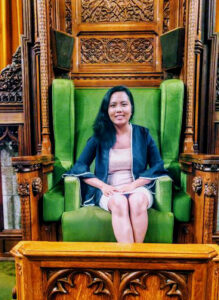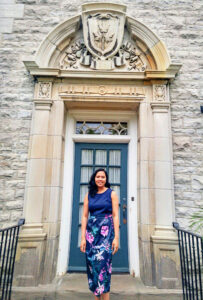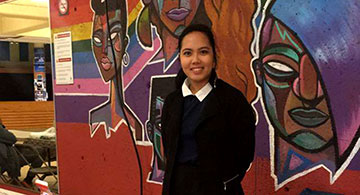Filipinos Success’ Stories:
Kaya Ko; Kaya Mo!
If I can; You surely can!
Interviewed by Marianne Rosal
I’m writing on behalf of the Alberta Filipino Journal regarding a monthly column “Kaya Ko, Kaya Mo.” This column features our fellow Filipinos (kababayans) who strive to reach their goals in Canada and have made an impact in the Filipino community.
This month, we would like to feature you for the column. If you are willing to be featured, I would like to ask you a few questions below:
What was your dream job as a child?
As a child, I wanted to be what a lot of Filipino parents wanted their children to be – a nurse or a doctor. I was an obedient child, so I studied hard to pursue that dream. I was the valedictorian in junior high and in high school, I was one of only 6 in my graduating class with the highest honours distinction.
What is your career path like? Did you have a goal in mind, or did things fall into place? Where there struggles you have to overcome? Barriers in culture or language? Was there schooling you had to take? Etc?
Still unsure of what I would like to be at the end of high school, I decided to take a general health science program at the University of Ottawa. In order to discover what I was really passionate about, I volunteered diligently in different places – in different hospitals and clinics that cater from paediatrics to palliative care and at the Wabano Centre for Aboriginal Health. I was also a research assistant at the Bruyère Research Institute. In second year, I took a class called socioeconomic and political determinants of health and I was struck by its content that politics and government policies have such a huge and direct impact on the lives of people. Conscious yet inspired by my new found knowledge, I went back home to Moosonee in Northern Ontario where my family settled and the population is about 90% Indigenous. I started a blog called Humans of Moose River and documented the lives of people there. Since I had a health science background, my initial aim was to explore the impact of poor healthcare in the area.  However, I discovered a lot more issues that exist as a result of government policies, especially as I have interviewed residential school survivors. I was amazed by the resilience of Indigenous people, but I also started to think about my own Filipino people and how policies have impacted them. Due to government policies, Filipinos and other racialized communities have also faced barriers, discrimination and disadvantage. Studies show that Filipino youth are underrepresented in post-secondary education. So in, 2017 I started the Filipino Student Association of the University of Ottawa to mobilize the Filipino university students and to reach out to others who are not as privilege to be in post-secondary education. I also joined the board of the Philippine Centre Canada, Tinig Pinoy Radio and with a group of community leaders, started Bayanihan Ottawa which aims to serve the young people through mentorship, scholarship and to bridge the intergenerational gap that exist in our community. There was an apparent momentum in the Filipino movement in Ottawa. However, one of the problems that we noted is that we don’t have a voice in Parliament. At that time when there was a movement, Senator Enverga passed away. I was discouraged that our voices and the momentum would die down. And so one day, with this passion in my heart for my Filipino community, I applied to the prestigious Summer Leadership Program to work in Parliament as an intern. I was surprised when I got a call for an interview, and the next thing I know, I was already seeing and meeting with MPs who I have just previously seen on TV. Being a Filipina in a space that had very few people of Filipino descent felt isolating and surreal. There was a feeling that I did not belong. Guards would always flag me down walking down the corridors of Centre Block – the center of power in Canada. Nevertheless, I felt extremely privileged and I want to speak up about the issues and concerns of the Filipinos in Canada, but at the same time, I was absolutely terrified to speak up lest I say the wrong things and I lose my internship. I was timid and rarely spoke up during meetings as good Filipinas should be, but I slowly realized that I am not doing anyone any favour if I remained quiet or shy. I admired my friends who were born in Canada who are outspoken and could formulate clever responses at a drop of a hat. I did not have that innate ability. But I realized, it was a blessing being born in the Philippines because I was able to understand the perspective of the many young people who came to Canada as 1.5 generation Filipino-Canadians who have been educated and raised in a totally different curriculum, beliefs and values. This way, I was able to relate to different generations which has given me a deeper insight into the intergenerational lived experience of the Filipino-Canadians.
However, I discovered a lot more issues that exist as a result of government policies, especially as I have interviewed residential school survivors. I was amazed by the resilience of Indigenous people, but I also started to think about my own Filipino people and how policies have impacted them. Due to government policies, Filipinos and other racialized communities have also faced barriers, discrimination and disadvantage. Studies show that Filipino youth are underrepresented in post-secondary education. So in, 2017 I started the Filipino Student Association of the University of Ottawa to mobilize the Filipino university students and to reach out to others who are not as privilege to be in post-secondary education. I also joined the board of the Philippine Centre Canada, Tinig Pinoy Radio and with a group of community leaders, started Bayanihan Ottawa which aims to serve the young people through mentorship, scholarship and to bridge the intergenerational gap that exist in our community. There was an apparent momentum in the Filipino movement in Ottawa. However, one of the problems that we noted is that we don’t have a voice in Parliament. At that time when there was a movement, Senator Enverga passed away. I was discouraged that our voices and the momentum would die down. And so one day, with this passion in my heart for my Filipino community, I applied to the prestigious Summer Leadership Program to work in Parliament as an intern. I was surprised when I got a call for an interview, and the next thing I know, I was already seeing and meeting with MPs who I have just previously seen on TV. Being a Filipina in a space that had very few people of Filipino descent felt isolating and surreal. There was a feeling that I did not belong. Guards would always flag me down walking down the corridors of Centre Block – the center of power in Canada. Nevertheless, I felt extremely privileged and I want to speak up about the issues and concerns of the Filipinos in Canada, but at the same time, I was absolutely terrified to speak up lest I say the wrong things and I lose my internship. I was timid and rarely spoke up during meetings as good Filipinas should be, but I slowly realized that I am not doing anyone any favour if I remained quiet or shy. I admired my friends who were born in Canada who are outspoken and could formulate clever responses at a drop of a hat. I did not have that innate ability. But I realized, it was a blessing being born in the Philippines because I was able to understand the perspective of the many young people who came to Canada as 1.5 generation Filipino-Canadians who have been educated and raised in a totally different curriculum, beliefs and values. This way, I was able to relate to different generations which has given me a deeper insight into the intergenerational lived experience of the Filipino-Canadians.
 When I graduated in October of 2018, I was offered a job at the office of the Minister of Canadian Heritage and Multiculturalism as the Parliamentary Secretary Assistant. Although there are no MPs or senators of Philippine heritage, there are relentless and strong champions on Parliament for Filipinos, such as my boss, MP Gary Anandasangaree, MP Salma Zahid who used her private motion bill to make June the Filipino Heritage Month in Canada, and MP Kevin Lamoureux, to name a few. I was fortunate that my boss recognized that Filipino voices are seriously lacking, so he graciously opened the door for myself and other young Filipinos who have worked with him. Recently, 12 interns from all over Canada made their way to Parliament. My heart was overjoyed seeing more Filipinos like myself. I do believe this is the beginning of something truly magnificent – a breakthrough for Filipinos to have a strong voice in Parliament. I am unsure of what the future holds. There is a saying on the Hill that politics is not a career. Perhaps one day, when I leave politics, I’ll find a calling that I am passionate about and then come back on the Hill to be an advocate for that cause. For now, I am satisfied to know that I am contributing in my own little way.
When I graduated in October of 2018, I was offered a job at the office of the Minister of Canadian Heritage and Multiculturalism as the Parliamentary Secretary Assistant. Although there are no MPs or senators of Philippine heritage, there are relentless and strong champions on Parliament for Filipinos, such as my boss, MP Gary Anandasangaree, MP Salma Zahid who used her private motion bill to make June the Filipino Heritage Month in Canada, and MP Kevin Lamoureux, to name a few. I was fortunate that my boss recognized that Filipino voices are seriously lacking, so he graciously opened the door for myself and other young Filipinos who have worked with him. Recently, 12 interns from all over Canada made their way to Parliament. My heart was overjoyed seeing more Filipinos like myself. I do believe this is the beginning of something truly magnificent – a breakthrough for Filipinos to have a strong voice in Parliament. I am unsure of what the future holds. There is a saying on the Hill that politics is not a career. Perhaps one day, when I leave politics, I’ll find a calling that I am passionate about and then come back on the Hill to be an advocate for that cause. For now, I am satisfied to know that I am contributing in my own little way.
How did you decide to come to Canada?
My mom came to Canada through the live-in caregiver program. She left a few days after I turned 6 and I did not see her again until I was almost 11 (5 years).
What advice would you give to your younger self?
The advice I’d give to my younger self is to not feel too pressured with what you’d would like to be in the future and to allow yourself to explore, make mistakes, and be open to change. You don’t have to be a nurse, doctor or lawyer to make an impact – indeed, a young person with passion and care for her community could make a huge difference. Don’t be afraid of speaking up especially if you know you are speaking the truth. Your voice is just as important as anyone else.
Thank you very much! Maraming salamat!



